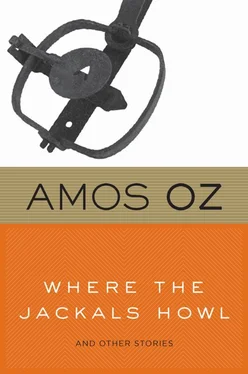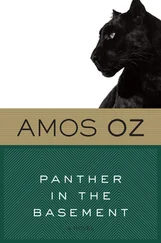Amos Oz - Where the Jackals Howl
Здесь есть возможность читать онлайн «Amos Oz - Where the Jackals Howl» весь текст электронной книги совершенно бесплатно (целиком полную версию без сокращений). В некоторых случаях можно слушать аудио, скачать через торрент в формате fb2 и присутствует краткое содержание. Год выпуска: 2012, Издательство: Houghton Mifflin Harcourt, Жанр: Современная проза, на английском языке. Описание произведения, (предисловие) а так же отзывы посетителей доступны на портале библиотеки ЛибКат.
- Название:Where the Jackals Howl
- Автор:
- Издательство:Houghton Mifflin Harcourt
- Жанр:
- Год:2012
- ISBN:нет данных
- Рейтинг книги:4 / 5. Голосов: 1
-
Избранное:Добавить в избранное
- Отзывы:
-
Ваша оценка:
- 80
- 1
- 2
- 3
- 4
- 5
Where the Jackals Howl: краткое содержание, описание и аннотация
Предлагаем к чтению аннотацию, описание, краткое содержание или предисловие (зависит от того, что написал сам автор книги «Where the Jackals Howl»). Если вы не нашли необходимую информацию о книге — напишите в комментариях, мы постараемся отыскать её.
Where the Jackals Howl — читать онлайн бесплатно полную книгу (весь текст) целиком
Ниже представлен текст книги, разбитый по страницам. Система сохранения места последней прочитанной страницы, позволяет с удобством читать онлайн бесплатно книгу «Where the Jackals Howl», без необходимости каждый раз заново искать на чём Вы остановились. Поставьте закладку, и сможете в любой момент перейти на страницу, на которой закончили чтение.
Интервал:
Закладка:
But the jackals had torn his face and ruined his beautiful square chin. Dov Sirkin appeared at his son’s funeral looking mortally ill. Zeshka did not talk to him and he did not talk to her. He tried to speak to Geula, but she did not answer.
Jet-black and frothy, the coffee bubbles in the steaming urns. Let it boil seven times, Geula Sirkin decides, a full seven times. Her lips are clenched. Her teeth are clenched. Her mouth is like a curved dagger.
4
AT SIX in the morning the sound of engines is heard from the direction of the tractor sheds, and the kibbutz members start moving down toward the dew-drenched fields. By eight o’clock the sky is already ablaze, its color changing from blue to a dirty white. Tractors, irrigation pipes, farming implements, all metal objects become inflamed. Put out your hand to touch or to take, and the response is white-hot hatred. The rusty faucets gurgle and emit splinters of iron.
At one time, many years ago, Dov Sirkin was in charge of all the orchards. He used to sing happily, ecstatically, as, stripped to the waist, he flitted like a knife among the rows of trees, appearing at one end of the orchard, shouting to scold and encourage the pickers, then disappearing and springing up at the other end. He had powerful shoulders and a chest and trunk like a bear’s: dark and dense.
Toward evening on summer days, he would wander around the orchards carrying on his shoulders a fair-haired little boy with slender, finely molded limbs, as pretty as a girl. Dov taught this boy to be ready to be tossed suddenly into the air without any warning, as high as the treetops, and to fall into his strong father’s arms without a cry of fear, without a sound.
“A man needs to be strong and self-assured,” he used to say, although he knew that these words were as yet beyond the child’s understanding. “To murder an innocent victim is the most repulsive crime in the world. To be the innocent victim yourself is almost as bad. And you, Ehud, you’re going to be a terribly strong man. So strong that nobody will be able to harm you, and you won’t need to harm other people, because they won’t dare start a fight. Now it’s getting dark and we’re going home. No, not together. You’re going on your own through the wadi and I’m going a different way. You must learn not to be afraid of the dark. Yes, there are all kinds of creatures in the wadi, but they will be afraid of you if you’re not afraid of them. Off you go.”
The orchard is laid out in blocks, each variety divided from the next by a neat furrow. Alexander the Great apples, coarse and lacking flavor. Gallia apples. Juicy Golden Delicious. Then come the peach trees, whose fruit is furry and smells intoxicating. And dark plums, and melancholy guavas, and then another block of apple trees of the variety called Incomparable. It was Dov Sirkin who laid out the plots and planted the saplings in the early days. This orchard would never have existed had it not been for Dov Sirkin and his persistence. He argued and threatened and bullied the founders of the kibbutz into accepting his schemes, and on two occasions he made mistakes and they told him he was mad, he should give up, and twice he uprooted and replanted. Twenty years ago he left his orchard and his family and the kibbutz and went out to roam the land. He did not even take the trouble to leave a letter behind.
Generations of jackals have passed away since then, but the young ones follow the lead of their fathers, and nothing is changed. In every generation the gray open spaces are filled night after night with sounds of wailing and jubilation, with cries of impiety, malice, and despair.
After the departure of Dov Sirkin the kibbutz was filled with noisy indignation: in those days, anybody who left the kibbutz was sure to be one of the weaklings, not a central pillar. And if one of the central pillars left, before going he would address a meeting and beat the table with his fist and call a spade a spade and expose once and for all the corruption that lay hidden behind the façade, and then sit back and listen to the speeches of reply in which they told him once and for all exactly what they thought of him and his motives. But Dov slipped away without any argument, without accusations or excuses: he disappeared early one morning and did not return in the evening, or the following day. Gone.
As time passed our anger subsided. There was perplexity. There was a shrugging of shoulders: He’s gone, let him go. We’ve known him a long time. We always knew.
Later a rumor sprung up concerning a girl from Mexico, an itinerant artist, and everything became clear. The kibbutz assumed responsibility for Zeshka and her children. It was Ehud who, at the age of fourteen and a half, constructed with his own hands the revolving milking-drum that transformed our dairy. When he was sixteen years old, he left school and began wandering about the mountains, and at that time he may already have been in the habit of slipping across the cease-fire line and returning unscathed. He made love behind the barn to girls from the Training Corps who were four or five years older than he. When he was drafted into the army he became more settled. At the age of twenty-three he was a major, and his name was known throughout the land. Only Geula caused us concern. Zeshka, too.
Dov went first to Haifa, where he worked on the docks to save a little money — he had sixty-two piasters in his pocket when he left the kibbutz. From Haifa he went to the Novomeisky mineral works on the shores of the Dead Sea. And from there he traveled to places both in Israel and abroad, and we lost track of him. In recent years — and this we know from a first-hand source — Dov Sirkin has settled in Jerusalem and become a geography teacher in the lower classes of a secondary school. His first heart attack forced him to slow down. After the second he gave up teaching and stayed at home. His face has turned very gray.
5
DOV SIRKIN was sitting in his home. It was night. He sat in his chair motionless and erect, not blinking, not yawning. He sketched with firm lines.
Two o’clock in the morning. An unshaded yellow electric light burned overhead. A flake of plaster drifted down from the ceiling and landed on an old wooden chair. Dov’s room was meticulously tidy. Every object lay in the exact spot where Dov had decided to place it, two years before the Declaration of Independence. Despite its precise order, the room seemed to be filled with a strident and unruly herd of piebald furniture. There was chaos in the combination of incongruous objects: the contrast between light, transparent curtains and an antique chest of drawers, an oval table dating from the years of Jerusalem’s Sephardic aristocracy and a dark wardrobe with legs carved in the shape of weird prehistoric creatures. In the middle of all this was a garish, flowery bedspread, colored red and blue and made of lingerie silk. A heavy chandelier hovered above the chaos. In the corner of the room a large flowerpot sent out twisted snakes of cactus in all directions, and in the center, at an ornate desk with gold and silver fittings, Dov Sirkin sat and sketched.
He laid down the compass and picked up a ruler. He put the ruler back in its place and began sharpening his pencil. He pressed too hard, breaking the point twice. Dov decided some compromise was necessary. From a heap of colored pencils he picked out a red and a black.
Many years before Dov had been a laborer in the port of Haifa, then a factory foreman, a trooper in His Majesty’s Bedouin Cavalry, an arms dealer in Latin America on behalf of the Jewish underground, a staff officer in the War of Independence, a development consultant in the Negev, and finally a teacher of geography, which in those days still retained its literal meaning of “drawing the Earth.”
Читать дальшеИнтервал:
Закладка:
Похожие книги на «Where the Jackals Howl»
Представляем Вашему вниманию похожие книги на «Where the Jackals Howl» списком для выбора. Мы отобрали схожую по названию и смыслу литературу в надежде предоставить читателям больше вариантов отыскать новые, интересные, ещё непрочитанные произведения.
Обсуждение, отзывы о книге «Where the Jackals Howl» и просто собственные мнения читателей. Оставьте ваши комментарии, напишите, что Вы думаете о произведении, его смысле или главных героях. Укажите что конкретно понравилось, а что нет, и почему Вы так считаете.












